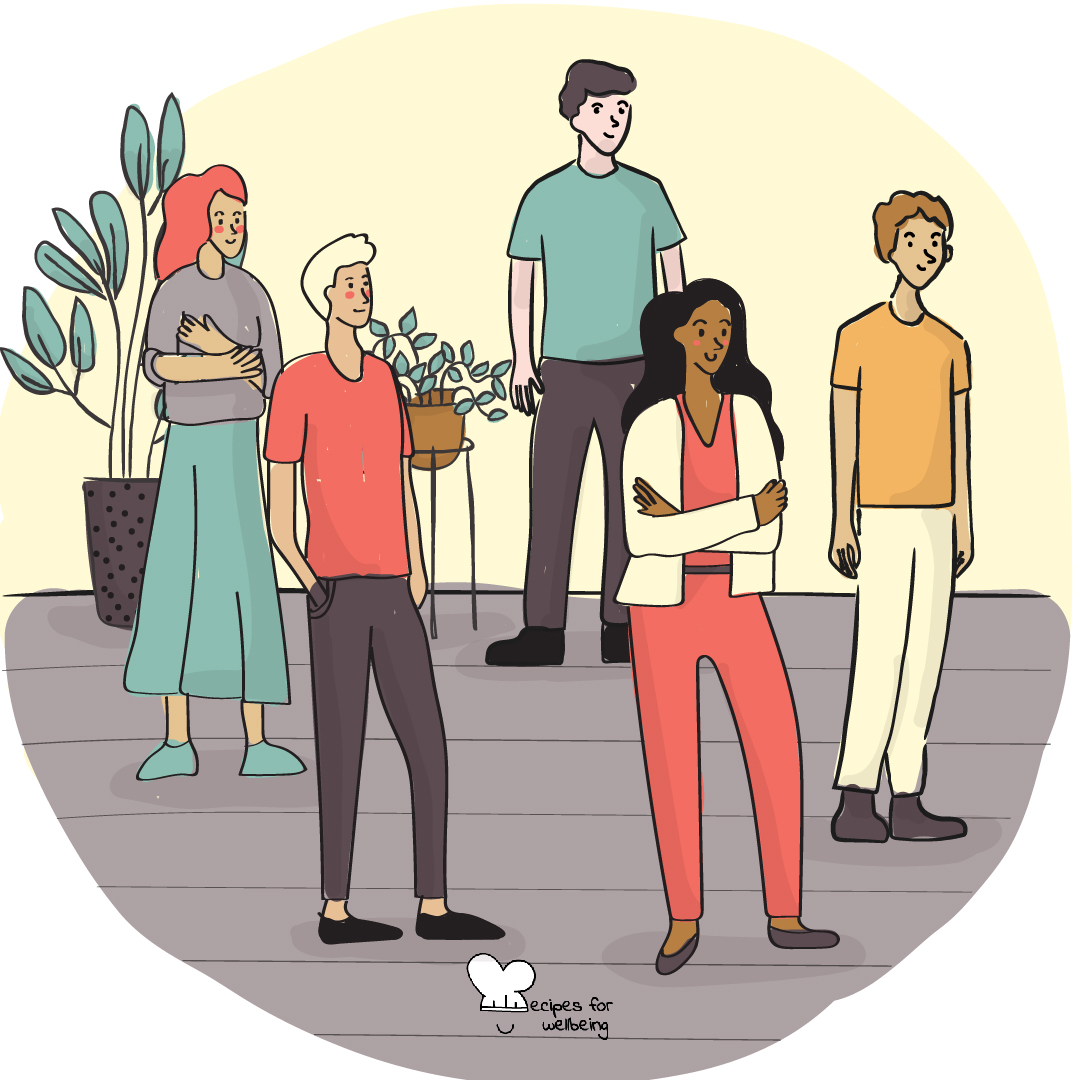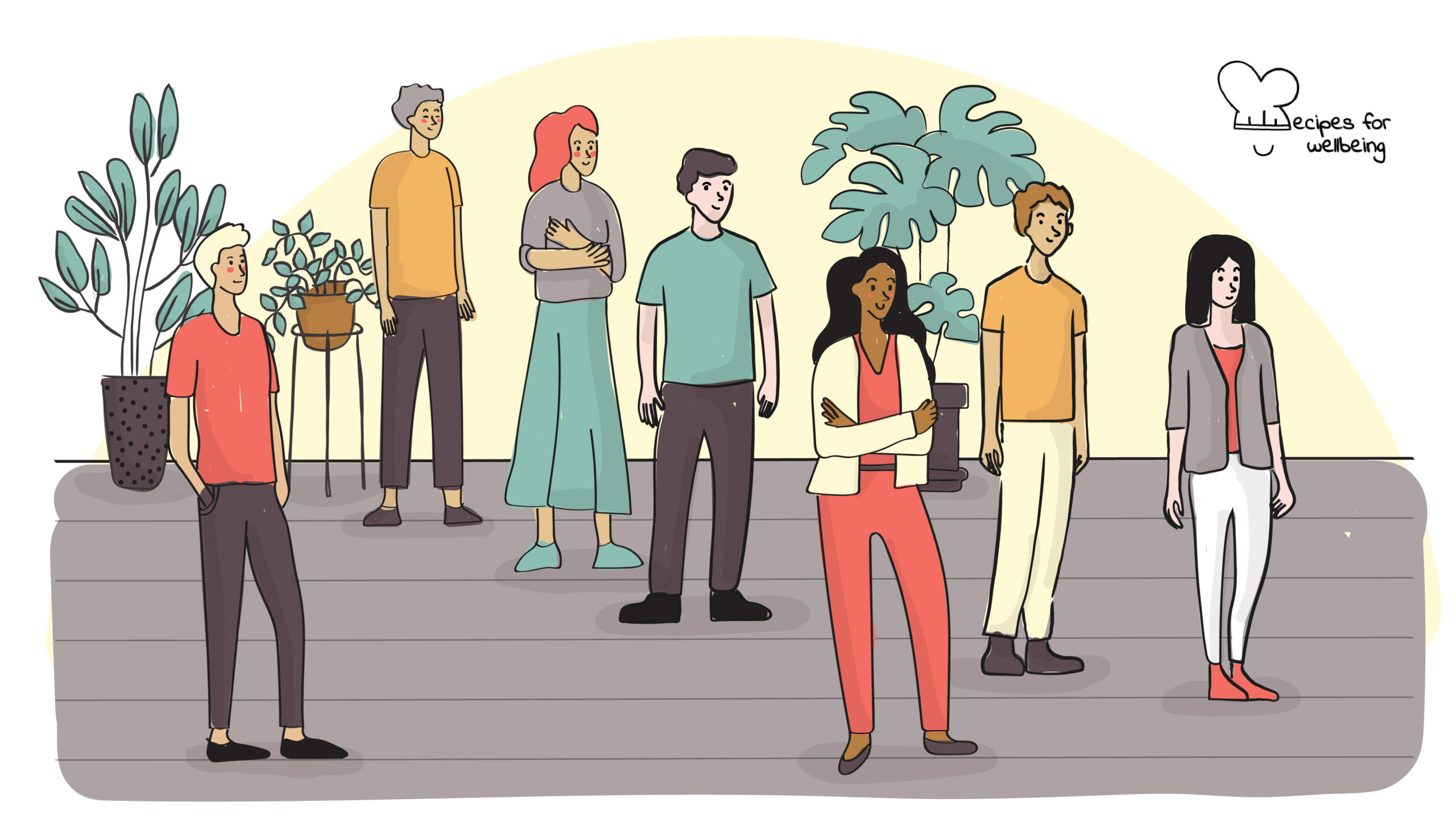
Take a step forward
Everything flows from the rights of the others and my never-ending duty to respect them. ―Emmanuel Lévinas
👥 Serves: 11-25 people, 26-40 people
🎚 Difficulty: Medium
⏳ Total time: 31-60 minutes
🥣 Ingredients: A group of people, open space, trust, respect, non-judgement, 1 long string of paper tape, slips of paper, 1 empty bag, 1 pen
🤓 Wholebeing Domains: Community, Discomfortability, Radical Care
💪 Wholebeing Skills: Acknowledgement, Allyship, Diversity, Empathy, Holding space, Liberation, Multiperspectivity, Openness, Trust, Vulnera-bravery

Take a step forward
📝 Description
A powerful activity to raise awareness about inequality of opportunity and foster empathy.
We are all equal, but some are more equal than others. This activity invites participants to take on roles and move forward depending on their chances and opportunities in life. It is an easier adaptation than our recipe “Privilege walk” because it asks participants to empathise with other people, rather than stepping forward or backward based on their personal life experiences. Still, it is a very powerful exercise to raise awareness of privilege and social justice.
This activity requires thorough facilitation, and should not be conducted carelessly or lightly. The power of this activity lies in the impact of actually seeing the distance increasing between the participants, especially at the end when there should be a big distance between those that stepped forward often and those who did not. To enhance the impact, it is important that you adjust the roles to reflect the realities of the participants’ own lives. As you do so, be sure you adapt the roles so that only a minimum of people can take steps forward (i.e. can answer “yes”). This also applies if you have a large group and have to devise more roles.
During the debriefing and evaluation it is important to explore how participants knew about the character whose role they had to play. Was it through personal experience or through other sources of information (news, books, and jokes)? Are they sure the information and the images they have of the characters are reliable? In this way you can introduce how stereotypes and prejudice work.
The guidelines have been adapted from the Council of Europe after experiencing this activity during the “Exploring a Culture of Pace through Personal Change and Wellbeing” offered by Alive Peace in Leysin (Switzerland) in October 2018. If you are looking for a more challenging follow-up activity, we encourage you to check out “The wheel of power and privilege” recipe.
👣 Steps
Step 1 – Prepare the role cards (prior)
Prepare (or print from this template) the following role cards for your participants:
- You are an unemployed single mother.
- You are the daughter of the local bank manager. You study economics at university.
- You are an Arab Muslim girl living with your parents who are devoutly religious people.
- You are a soldier in the army, doing compulsory military service.
- You are a disabled young man who can only move in a wheelchair.
- You are a 17-year-old Roma (Gypsy) girl who never finished primary school.
- You are the daughter of the American ambassador to the country where you are now living.
- You are the owner of a successful import-export company.
- You are a retired worker from a factory that makes shoes.
- You are the girlfriend of a young artist who is addicted to heroin.
- You are an HIV positive, middle-aged prostitute.
- You are a 22-year-old lesbian.
- You are an unemployed university graduate waiting for the first opportunity to work.
- You are a fashion model of African origin.
- You are a 24-year-old refuge from Afghanistan.
- You are a homeless young man, 27 years old.
- You are an illegal immigrant from Mali.
- You are the president of a party-political youth organisation (whose mother party is now in power).
- You are the son of a Chinese immigrant who runs a successful fast food business.
- You are the 19-year-old son of a farmer in a remote village in the mountains.
Place the cards in an empty bag.
Step 2 – Hand out the roles (5’)
Create a calm atmosphere with some soft background music. Alternatively, ask the participants for silence. Ask participants to take a role card out of the bag. Tell them to keep it to themselves and not to show it to anyone else. Invite them to sit down (preferably on the floor) and to read carefully what is on their role card.
Step 3 – Empathise with the role (5’)
Now ask them to begin to get into the role. To help, read out some of the following questions, pausing after each one, to give people time to reflect and build up a picture of themselves and their lives:
- What was your childhood like? What sort of house did you live in? What kind of games did you play? What sort of work did your parents do?
- What is your everyday life like now? Where do you socialise? What do you do in the morning, in the afternoon, in the evening?
- What sort of lifestyle do you have? Where do you live? How much money do you earn each month? What do you do in your leisure time? What do you do during your holidays?
- What excites you and what are you afraid of?
It is possible that some participants may say that they know little about the life of the person they have to role-play. Tell them, this does not matter especially, and that they should use their imagination and to do it as best they can.
Step 4 – Line up (5’)
Now ask people to remain absolutely silent as they line up beside each other (like on a starting line). Tell the participants that you are going to read out a list of situations or events. Every time that they can answer “yes” to the statement, they should take a step forward. Otherwise, they should stay where they are and not move. When the participants are lined up at the start, walk along the line unwinding the ribbon as you go.
As you pass each person takes hold of the paper tape, so that everyone ends up “joined” together along the line. When the moment comes to take a step forward, some participants will be faced with the dilemma of whether or not to move and break the string. It may also be the case that those left behind blame the others for breaking the line. It may therefore be necessary to remind people of the rule that “every time they can answer ‘yes’ to the statement, they should take a step forward. Otherwise, they should stay where they are and not move.”
Step 5 – Step forward (15’)
Read out the situations one at a time. Pause for a while between each statement to allow people time to step forward and to look around to take note of their positions relative to each other.
- You have never encountered any serious financial difficulty.
- You have decent housing with a telephone and television.
- You feel your language, religion and culture are respected in the society where you live.
- You feel that your opinion on social and political issues matters and your views are listened to.
- Other people consult you about different issues.
- You are not afraid of being stopped by the police.
- You know where to turn for advice and help if you need it.
- You have never felt discriminated against because of your origin.
- You have adequate social and medical protection for your needs.
- You can go away on holiday once a year.
- You can invite friends for dinner at home.
- You have an interesting life and you are positive about your future.
- You feel you can study and follow the profession of your choice.
- You are not afraid of being harassed or attacked in the streets, or in the media.
- You can vote in national and local elections.
- You can celebrate the most important religious festivals with your relatives and close friends.
- You can participate in an international seminar abroad.
- You can go to the cinema or the theatre at least once a week.
- You are not afraid for the future of your children.
- You can buy new clothes at least once every three months.
- You can fall in love with the person of your choice.
- You feel that your competence is appreciated and respected in the society where you live.
- You can use and benefit from the Internet.
- You are not afraid of the consequences of climate change.
- You are free to use any site on the Internet without fear of censorship.
Step 6 – Debrief (30’)
At the end invite everyone to take note of their final positions. Then give them a couple of minutes to come out of role before debriefing in plenary. Start by asking participants about what happened and how they feel about the activity and then go on to talk about the issues raised and what they learnt.
- How did people feel stepping forward – or not?
- For those who stepped forward often, at what point did they begin to notice that others were not moving as fast as they were?
- Did anyone feel that there were moments when their basic human rights were being ignored?
- Can people guess each other’s roles? (Let people reveal their roles during this part of the discussion)
- How easy or difficult was it to play the different roles? How did they imagine what the person they were playing was like?
- Does the exercise mirror society in some way? How?
- Which human rights are at stake for each of the roles? Could anyone say that their human rights were not being respected or that they did not have access to them?
- What first steps could be taken to address the inequalities in society?

